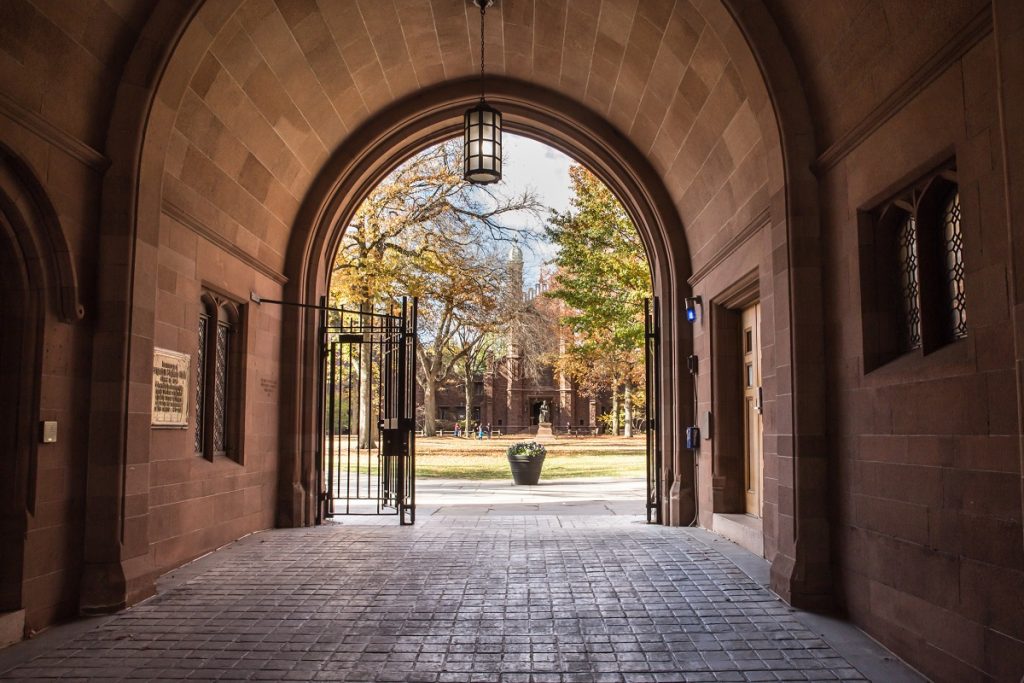The King James Version of the Bible sometimes used language from which we more gentle contemporary folk shy away. At John 11:39, for example, Lazarus is in his tomb, and Jesus orders the stone rolled back. Martha, the sister of the deceased, objects: “Lord, by this time he stinketh: for he hath been dead four days.” Nowadays, we use a passive construction: “there will be a stench.” No need to get personal about it.
There is a popular vision of the modern university that has been with us for a century. Supposedly, the university is an association of scholars unencumbered by any preconceptions. The scholars are dedicated to following the evidence to whatever conclusions they find, establishing a wide-open marketplace of all ideas. They are supported in this endeavor by trustees and administrators who respect this search, and not only pay them decently but also give them the protection of tenure so that, even if the scholars come to unpopular conclusions, their jobs are safe. They are eager to pass on their knowledge, without pride or prejudice, to the next generation of citizens and potential scholars.
It sounds beautiful. Yet something smells pretty funky at our colleges and universities.
The Contemporary Idea of the University
Start your day with Public Discourse
Sign up and get our daily essays sent straight to your inbox.Scholars have repeatedly assured us that the unbiased pursuit of knowledge is their mission. According to the American Association of University Professors’ 1915 Declaration of Principles, universities exist:
a. to promote inquiry and advance the sum of human knowledge;
b. to provide general instruction to the students; and
c. to develop experts for various branches of the public service.
Academic freedom and tenure are vitally necessary to those ends. They protect the integrity and credibility of the scholar and thereby ensure the usefulness of the scholar’s conclusions for the community.
The Declaration asserts that the university can “help make public opinion more self-critical and more circumspect” and “check the more hasty and unconsidered impulses of popular feeling.” This is accomplished by scholars whose conclusions are “the fruits of competent and patient and sincere inquiry . . . set forth with dignity, courtesy, and temperateness of language.” The document particularly emphasizes the need for professors to resist partisan indoctrination of their students:
The teacher ought also to be especially on his guard against taking unfair advantage of the students’ immaturity by indoctrinating him with the teacher’s own opinions before the student has had an opportunity fairly to examine other opinions upon the matters of question . . . It is not the least service which a college or university may render to those under its instruction, to habituate them to looking not only patiently but methodically on both sides, before adopting any conclusion upon controverted issues . . .
It is manifestly desirable that such teachers have minds untrammeled by party loyalties, unexcited by party enthusiasm, and unbiased by personal political ambitions; and that universities should remain uninvolved in party antagonism.
Many of our contemporary university scholars really believe in these principles. Many even try hard to live up to them. Yet something smells very bad at many universities.
We hear that our institutions of higher learning merely crank out properly skilled and indoctrinated professionals rather than educated and independent citizens; that professors use the power of their position to impose one point of view rather than give students all sides of the argument, pushing their own political opinions in place of the proper subject matter; that students openly attack not only opinions with which they disagree but also the people who hold them; that professors support students in their violation of both academic freedom and the constitutional right to free speech; and that university administrators and faculty support—or at best offer token resistance to—these abuses.
What has happened?
Planned Obsolescence
The modern university project, as articulated by the AAUP under the guidance of John Dewey’s pragmatist vision, was never intended to last this long. It is a project of planned obsolescence, and those who continue to proclaim that the principles of free and open inquiry and the marketplace of ideas are alive and well are fooling only themselves.
Let us return to the AAUP’s own standards as articulated in the 1915 Declaration. Admitting that the earliest forms of colleges and universities used to exist for the sake of providing general instruction (Purpose B), the AAUP notes that they became in modern times the home of scientific research (Purpose A)—which itself became the standard of all knowledge acquisition: if it cannot be obtained by the scientific method, it is not knowledge at all. Immediately, any form of received wisdom, let alone religious revelation or testimony, is no longer accepted by the academy as knowledge.
For what, however, is this knowledge being sought? What is the end of their scientific research? It is now articulated in Purpose C: universities create experts for the guidance of democracy. It is not enough that, because of their erudition, professors happen to be a good source of expertise. Rather, this is where experts are made, because only these experts have knowledge. Indeed, it is the place of the creation of knowledge, the “wresting from nature of her intimate secrets,” and turning them into useful nuggets of information. Knowledge is not sought for its own sake, but for the sake of expertise.
For what, however, does democracy need experts? Here things get a bit fuzzier, but not so fuzzy that we cannot discern a theme. The notion of the wide-open marketplace of ideas hails from John Stuart Mill. He sought to educate society to maximize the good (defined as pleasure and the absence of pain) for the greatest number of people. To attain this goal, we must open up education to all ideas, especially ones long rejected by polite societies, and open up society to as many lifestyle choices as possible, lest we be deprived of choices that might help maximize pleasure.
The pragmatist’s goal is less clear, but no less subjective: social progress. A proposition provides knowledge if it works in relation to this goal. So what the academy exists to do, according to the pragmatist vision of the AAUP, is to bring about social progress, and the other goals of the university serve this end—including the “marketplace of ideas.”
Indeed, it is not really a marketplace at all, where all ideas will always be available for examination.
It should be an intellectual experiment station, where new ideas may germinate and where their fruit, though still distasteful to the community as a whole, may be allowed to ripen until finally, perchance, it may become part of the accepted intellectual food of the nation or of the world. Not less is it a distinctive duty of the university to be the conservator of all genuine elements of value in the past thought and life of mankind which are not in the fashion of the moment. Though it need not be the “home of beaten causes,” the university is, indeed, likely always to exercise a certain form of conservative influence.
There is a certain beguiling innocence to the picture presented here of the preservation and conservation of “all genuine elements of value” from our past. The vision is shattered, however, when one realizes that much of what has been taken for millennia as permanently valuable has come, through this very project, to be perceived as “beaten causes.” It has been over one hundred years since the AAUP first articulated these standards, and it should be no surprise to us that large swaths of the professoriate think that “science” has answered most of the questions that need answering, and that it is high time to shut down the “beaten causes.”
When the purpose of education is understood as the pursuit of such subjective entities as “pleasure” or “social progress,” knowledge becomes merely a means to an end, and reason becomes a servant of desire. What is sought is power, and knowledge is its tool. The powerful themselves decide what even counts as knowledge. No longer can an objective Truth help us to recognize whether power is being used or abused.
The Tyranny of Experts
On today’s college campuses, knowledge exists as a mere means to an end. For a while, students (and their parents) were told that going to college was an investment that would pay off in far greater earning power. As white-collar jobs became harder to come by and both tuition and debt climbed, that notion began to smell a bit fishy. Nowadays, the point of going to college or university is activism. On the nominally Catholic campus, it might be described as something more like “striving for the common good,” but the means-end relationship is the same. What are the dominant themes of contemporary university classes? Understanding cultures, not on their own terms, for their beauty and contributions to human flourishing, but in terms of power structures. The history of oppression. Cultural appropriation. The sociology of victimhood. Microaggressions. Intersectionality. College credit for mandatory “volunteer” work. Social causes and social work. Student groups for every conceivable victim class. Administrative efforts to reach out to and mollify every conceivable victim class, even before anything happens. When something does happen, we see the stirring up of outrage rather than reconciliation. Our campuses, our administrative activities, our staff offices, our curricula, our extracurricular activities—these are all being swallowed up in the huge maw of activism.
Our students walk on eggshells, waiting for the next moment of oppression to happen, waiting to release their next wave of outrage. Our professors are on tenterhooks, apprehensive lest the thing that yesterday was a fine teaching tool is today an aggression.
If it’s all about power, the teacher would seem to have all the power, and that teacher’s political agenda readily becomes the “knowledge” to be learned in the class. The “beaten causes” are dismissed. But two can play the power game, and contemporary students have learned well from their masters. When you are paying tens of thousands of dollars to become an expert activist, what is the point of listening to ideas you find distasteful? They, too, are “beaten causes” that deserve no home. Shout them down. Trap the professor. Drive him from campus in disgrace.
We were duped into believing that, because the professoriate entered sincerely into the unencumbered search for knowledge, the best ideas would really win the day, protecting us from both the tyranny of the autocratic regime and the tyranny of the majority. But who protects us from the tyranny of experts? And what guarantees that the ideas they settle on are actually good ideas? When the discovery of objective truth is replaced by the pursuit of information that can be used to wield power over others, tyranny of some kind is the inevitable result.
The modern university project, envisioned by so many of us as the honest search for truth for its own sake, and the free exchange of ideas, suffers from something bad in its contemporary form. For surely it stinketh. But we should not be surprised. It was dying at its birth.














